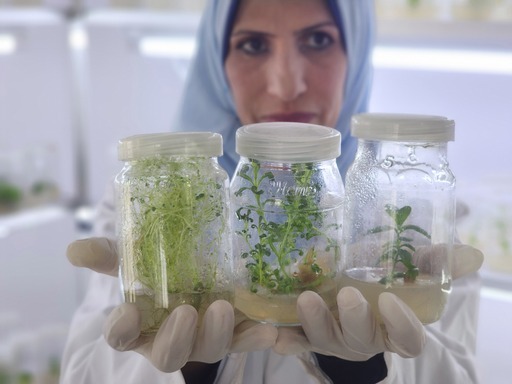Despite the ongoing blockade imposed by Israel on the Gaza Strip Palestinian women linked up and innovated an alternative to traditional sugar for diabetics and people wishing not to consume sugar using the tropical herb stevia. The herb is being grown in a greenhouse inside a house in Rafah city in southern Gaza Strip.
Three Palestinian women Saada Al-Majdalawi Asala Abu Shinar and Sahar Abu worked for several months on the stages of producing the alternative sweetener starting by growing the herb inside a small greenhouse in order to provide a source for the natural product passing through the drying process and moving to the extraction process that is performed using devices that they manufactured locally before packaging the product for sale at the market.
The project leader 25-year old Asala Abu Shinar from Khan Yunis works as a food technology specialist. She graduated from the University College of Science and Technology in the governorate.
During her graduate research Abu Shinar worked with a number of female students focusing on the stevia plant under the guidance of her teacher 36-year old Saada Al-Majdalawi who became her partner in this project and embraced it in her home in Rafah city. Al-Majdalawi said that she gained extensive experience in the field of plant tissue culture from her work in the Ministry of Agriculture in Gaza for years.
“Stevia is a perennial herbaceous plant that lasts five years and its leaves are picked three times annually” Abu Shinar explained. The stevia plant is grown in sandy clay soil in a greenhouse which can reach high temperatures of 35 degrees Celsius. For optimal growth the plant also requires about 16 hours of exposure to the sun and fresh water.
According to Abu Shinar “In its leaves there are non-sugar compounds which can be dried inside the greenhouse for 3 days then they are ground in a blender to start the extraction process through the glass Soxhlet device using water evaporation technology. Then the extract is transferred to purify it from any microbes and it is placed in a rotary evaporator to separate the water from the substance for a period of 90 minutes at a temperature of 60 degrees Celsius.”
Abu Shinar explains that two drops of the final product “are equivalent to a teaspoon of natural sugar.”
Regarding the benefits of the extract Abu Shinar says that it “strengthens the immune system in the body especially for patients with cancer diabetes and obesity; it is a preventive and not a curative extract.” Its uses are many not only for drinks but it can be used for preparing food and desserts of all kinds. The team obtained an official government license to operate and they produce 1000 bottles per month.
Talking about the difficulties and challenges that the team’s work faced Abu Shinar noted that “the work was not easy in light of the lack of many materials and equipment and the ban on importing them through the Israel-controlled crossings.” She further added that “one of the most prominent difficulties was the long hours of interrupted electricity and cut power while working which affects the extraction process. In addition we lack some of the necessary containers have limited agricultural space and some chemical materials are unavailable.”
“We will keep thinking up and inventing new methods to challenge the occupation and its siege and plights because we deserve a better and peaceful life” she concluded.
– Wafa Aludaini is a Gaza-based journalist and activist. She contributed this report to the Palestinian Information Center.














